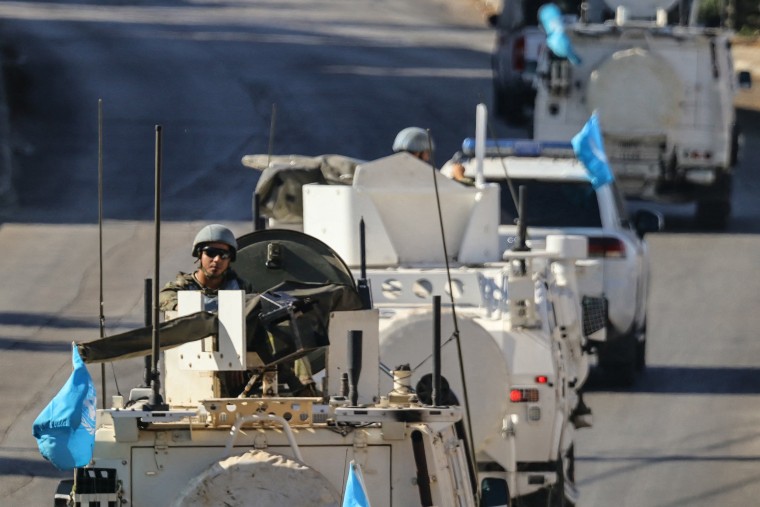The United Nations said that it will not yield to pressure to withdraw its peacekeeping forces from southern Lebanon, despite its forces coming under fire and repeated demands from Israeli Prime Minister Benjamin Netanyahu to leave the region.
The head of peacekeeping operations, Jean-Pierre Lacroix, told reporters in New York that the United Nations Interim Force in Lebanon, known as UNIFIL, would remain in “all its locations,” including sites near the border where Israel is fighting Iran-backed Hezbollah. on monday.
He added that the decision to maintain it had the full support of the United Nations Security Council and member states contributing troops to the force, which Israel says has failed in its mission to stabilize the region as Hezbollah’s presence increases.
The two sides have been witnessing clashes for decades, since the Iranian-backed group began firing rockets more than a year ago in solidarity with its ally, Hamas, after the terrorist attack launched by the Palestinian group on Israel, which led to the killing of 1,200 people and the taking of 250 hostages. More than 42,000 people were killed in Gaza in the ensuing war, according to local health officials.
The fighting near the Israeli-Lebanese border prompted hundreds of thousands of people from both sides to flee their homes. In recent weeks, Israel has redoubled its offensive after the large-scale bombing of Lebanon began on September 17, when pagers belonging to members of Hezbollah, Iran’s most powerful proxy force for a long time, exploded across the country.
On October 1, Israeli forces crossed the border after the country’s military leaders announced a new phase in the war.
Lecroix’s statements came after the UN Security Council expressed “grave concern” at a meeting held to discuss the four UNIFIL soldiers who were injured after Israel fired on their positions last week. A fifth was wounded by gunfire during military activity, although it was not clear who fired the shots.
The series of events sparked international criticism, with Spain, France and Italy condemning the events. President Joe Biden’s assertion that he is “absolutely and positively” asking Israel to stop striking peacekeepers highlights how much the situation has worsened.
UNIFIL, established by the UN Security Council in 1978 after Israel’s first invasion of Lebanon, also accused the IDF of shooting its cameras, destroying its main gate and forcibly entering one of its sites.
The Israeli army promised to investigate some of the incidents, which came as it continued to fight Hezbollah forces in the region.
In a video speech on Sunday, Netanyahu said He said that UNIFIL provides a “human shield to Hezbollah terrorists” and appealed directly to UN Secretary-General Antonio Guterres to keep UN peacekeepers “out of harm’s way.”
Ahmed Benchemsi, a spokesman for Human Rights Watch in the Middle East, told NBC News that there was “absolutely no justification” for shooting at UN forces.
“Peacekeepers are considered civilians, even if they are armed,” he said, adding that it was important for UNIFIL to remain on the ground.

Shortly after Netanyahu’s video was released, UNIFIL spokesman Andrea Tenenti denied the IDF’s claims that UNIFIL forces were already present, providing cover for Hezbollah.
Israel’s relationship with the United Nations has long been tense, which has deteriorated significantly since October 7, most notably when Israel accused employees of UNRWA, the United Nations agency for Palestinian refugees, of collaborating with Hamas.
UNRWA expelled nine of its staff following an internal investigation, but the UN has also not shied away from criticizing Israeli military operations in both Gaza and Lebanon.
Netanyahu accused the United Nations of being an “anti-Semitic swamp” during his speech to the organization’s General Assembly in September, and Israeli Foreign Minister Israel Katz declared Secretary-General Guterres “persona non grata” and banned him from entering Israel.
Against the backdrop of its invasion of Lebanon, Israel is also considering its response to the missile attack launched by Iran earlier this month, raising fears that massive retaliation could spark a broader regional conflict.
But Netanyahu told the United States that it was ready to launch a limited counterstrike aimed at preventing a full-scale war, and would target the country’s military infrastructure and not its nuclear or oil facilities, according to a report. In the Washington Post.
Biden has said publicly that he would not support an Israeli strike on Iranian nuclear sites, while reaffirming his “right of response” to the October attack.
In a statement to the newspaper, Netanyahu’s office said: “We are listening to the views of the United States, but we will make our final decisions based on our national interest.”

“Internet practitioner. Social media maven. Certified zombieaholic. Lifelong communicator.”

